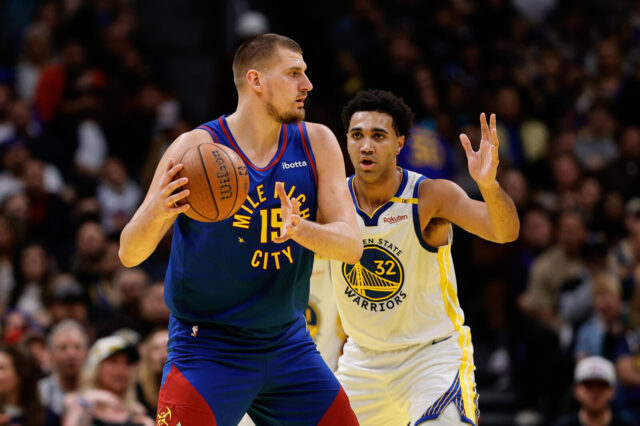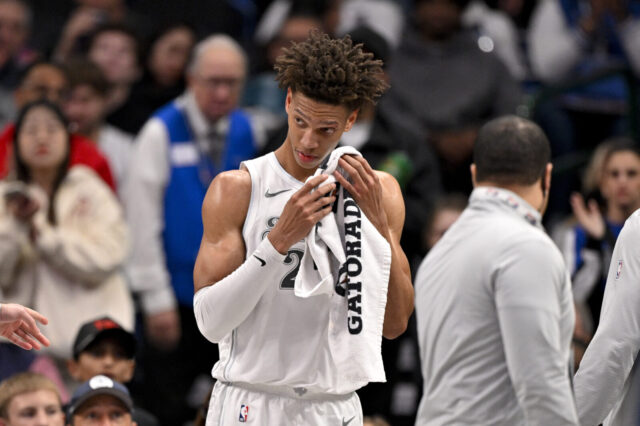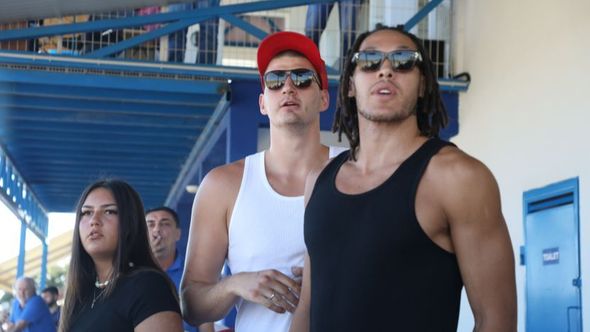In order to adequately appreciate what has gone on in both Seattle and Sacramento the last five years, it's important to look at the Nuggets own history. A history which includes a Commissioner altruistically and unwittingly nearly destroying the franchise, five separate owners in 11 years, and a fateful decision by one ownership group to finance a brand new arena.
The story begins right here …
David Stern and the pursuit of minority ownership
In 1989, at the behest of Commissioner David Stern, an ownership group comprised of four African American businessmen led by Peter Bynoe and Bertram Lee (along with former US Commerce Secretary Ron Brown and tennis legend Arthur Ashe) purchased the Denver Nuggets from Sidney Shlenker for roughly $65 million. This was met with much pomp and circumstance, and was even announced at big press conference at the Waldorf-Astoria in New York City. There was every reason to believe that this was a great moment in Denver history and NBA history. There was one only one problem. They (specifically Bertram Lee) couldn’t afford to purchase an NBA franchise.
Shlenker set a deadline for purchase for six months after the much ballyhooed press conference. With the help of elements outside the NBA, COMSAT Video Entertainment group purchased 62.5% of the team. What followed was an absurd kabuki theater, with Bynoe and Lee being put up front as the team "owners" while one of the partners, Lee, was virtually bankrupt and was evicted from his Boston apartment.
Things got so difficult that Lee was later "removed" in 1991 and the Nuggets as a team were in chaos (a 20-62 record in the 1990-91 season). In 1992 Peter Bynoe (who for all intents and purposes was the genuine article, stand up guy who provided his share of money) finally sold his stake to COMSAT and left after publicly feuding with COMSAT Chairman Robert Wussler Jr.
While it's easy to point a finger at Bynoe and Lee for their attempts to own an NBA franchise – let us not forget the vital role David Stern played in this episode. Stern's well-meaning zeal for minority ownership in the NBA caused him to make a near-fatal mistake with the Nuggets franchise. Not properly vetting the ownership group prior to that (in hindsight) overblown press conference in New York resulted in two solid years of ownership chaos that almost crippled the franchise itself. This set the tone for one of the worst decades of basketball in NBA history (despite going to the playoffs in 1994 and 1995, the Nuggets went 279-509 from 1990-2000).
COMSAT and Ascent Entertainment Group: The reluctant owners
COMSAT Video Entertainment Group found itself the unwitting owners of an NBA franchise in Denver. While COMSAT’s last-minute inclusion in the ownership deal to buy the team from Sidney Shlenker temporarily saved the Bynoe/Lee facade of ownership, it didn’t necessarily improve the Nuggets’ station. In 1990 Bynoe hired Bernie Bickerstaff as team president and general manager, and COMSAT retained Bickerstaff after Bynoe was bought out. Bickerstaff fired Doug Moe, chose to trade Lafayette “Fat” Lever to Dallas, let Alex English go via free agency, and brought on the disastrous reign of Paul Westhead and his ridiculous offense.
While all this was going on COMSAT remained on the sidelines, letting Bickerstaff to continue to run the show. He rebounded well after losing Moe, Lever, and English by hiring Dan Issel as head coach, drafting Dikembe Mutombo, LaPhonso Ellis, Bryant Stith, and Rodney Rodgers. But it was also Bickerstaff who would watch all that good work get destroyed. The events of the later Bickerstaff years are well worn, but were extremely disastrous. Full breakdowns of the Bickerstaff regime have been gone over by Andrew Feinstein and myself for many years.
However, during this time COMSAT (through it's subsidary Ascent) was deep in negotiations to purchase the Quebec Nordiques of the NHL, with plans of moving them to Colorado. Seeing an opportunity to expand into a market that hadn't been exploited in the state of Colorado since the early 1980's. The newly renamed Colorado Avalanche won a Stanley Cup in their first season in Denver, but COMSAT was losing money.
Before the Avalanche could win the Stanley Cup, COMSAT divested itself from its sports-management subsidiary (created specifically in the early 90's to manage the Nuggets) Ascent Entertainment Group which was left as its own entity to run the Nuggets and Avalanche franchises.
However, it became abundantly clear that COMSAT and Ascent were only semi interested in retaining ownership of both clubs, in 1997 they lost $18.6 million on both. In late 1997, they began putting out signals that they intended to sell the team. Thus began a tumultuous three years featuring three separate owners and several near-sales that would have potentially resulted in the Denver Nuggets leaving the state of Colorado.
Liberty Media, The Pepsi Center and an anchor for Colorado
Shortly before Ascent Entrainment Group was absorbed by Denver media giant Liberty Media in 1997, ground had already been broken on the Pepsi Center. It was determined by Ascent that old McNichols Sports Arena was antiquated, and the $12 million in upgrades that Sidney Schlenker added in the 80's was insufficient. So rather than take the approach that Seattle did with Key Arena (which was heavily renovated in the mid 90's) COMSAT and Ascent dove headlong into building the Pepsi Center (which was partially financed by Ascent, partially publicly financed with sole ownership/debt belonging to COMSAT/Ascent)
Liberty Media never intended to keep the Nuggets, the Avs, and what would become the Pepsi Center. You can look at their eventual absorption of Ascent Entertainment as the media dynamo's attempt to corner the market in all things media. After acquiring Ascent Entertainment Group, Liberty immediately put the Nuggets, Avs and Pepsi Center up for sale. When the arena finally opened in 1999, it was an ultra-modern slice of life. For all the charm of McNichols (and believe me when I say "Big Mac" was MUCH louder and rowdier than the Can … think ARCO Arena circa 2000) it just couldn't compete with the luxury and amenities that the Pepsi Center provided. The arena was a game changer … and a money maker.
Liberty Media, primarily because of the Pepsi Center, had many bidders for the teams. Weirdly, Denver billionaire Donald Sturm's attempt to purchase the Avs and Nuggets was thwarted by his refusal to commit to stay IN DENVER. He had a winning bid, but was rejected (Liberty Media and the city of Denver were steadfast that any bidder commit to keeping the Nuggets in Denver for 25 years after purchase).
Another bidder, Bill Laurie (Stan Kroenke's brother-in-law) attempted to purchase the teams (in an ownership group that featured John Elway and Pat Bowlen) and this got so far as to being the actual "winning" bid sometime in 2000. However, rumors of Laurie's desire to see basketball in St. Louis came out (and Ascent shareholders sued saying Laurie's bid was too low), and the bid failed at the last moment. Then Stan Kroenke stepped in and won the Pepsi Center sweepstakes and the sale was made official in July of 2000.
Make no mistake my friends, while the Nuggets and Avalanche were great to own … the desired object for all bidders was the Pepsi Center. Imagine the weak hand the city of Denver would have to play if Big Mac was still around? You can see that COMSAT's fateful decision to go ahead with building a new arena in lower downtown (and capitalizing on some Broncos success and goodwill from the Denver populace) changed the fortunes of a moribund team that played horrible basketball for nearly a decade.
The moral: Billionaires want their cake and eat it too
The people of Seattle and Sacramento have been subjected to the worst kind of ransom. Build our arenas, subsidize us so we can make more money. COMSAT/Ascent had the foresight to invest in an arena themselves. While community after community is held hostage to corporate will, the fateful decision to build their own arena saved a lousy franchise and helped go a long way toward rebuilding to the success we know now.
The NBA is filled with some of the worst owners in professional sports. Be it Donald Sterling, the Maloof brothers, Robert Sarver, or Dan "I put a curse on you" Gilbert … it's a scourge on the NBA. It doesn't help that the league that shepherds these lousy owners then turns around and sticks it to communities to foot the bill for shiny arenas so they can make money. It's a sad comment on many aspects of NBA business.
If COMSAT/Ascent didn't fund their own arena, the bidders to buy the Denver arena teams would have been much less inclined to keep the Nuggets here. Because of horrible ownership decisions in the early 90's, the Nuggets were nearly lost to Denver in the late 90's. However, is that right? Why is it that communities must fund the whims of people who can most likely afford to build themselves? One of the darkest legacies of David Stern seems to be abject corporate welfare and the shameful episodes that led to Seattle losing its team (Howard Schultz should be ashamed for selling the Sonics to a guy he should have known wanted to move the team), and Sacramento on the verge of losing theirs. How many more communities will have to suffer what these cities have been through?
In 1999 the Pepsi Center opened its can and saved the Nuggets as we know them. It's sad that in hindsight it took that building to keep basketball in Denver.
The question now is … will that be enough in 2025?
***
Twitter: @jmorton78 https://twitter.com/#!/jmorton78


